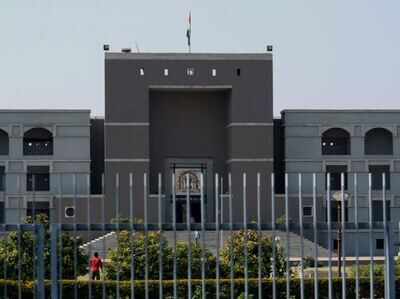- News
- City News
- ahmedabad News
- Mere consent waiver can’t annul women’s land rights, says Gujarat high court
Mere consent waiver can’t annul women’s land rights, says Gujarat high court

Gujarat high court
AHMEDABAD: In an important order, the Gujarat high court has held that a mere consent affidavit by a sister waiving her rights to ancestral property cannot be treated as a relinquishment deed and her right to a share in the ancestral property is not extinguished.
A woman can claim a share and challenge mutation entry in the ancestral property on the exclusion of her name, if her name is excluded without following the procedure under Section 135D of the Gujarat Land Revenue Code. A mere consent affidavit waiving her rights in favour of brothers is not enough to end her property rights.
The case before the high court was from Shihor. Haji Deraiya left behind ancestral land. His daughters Roshan Sorathiya and Hasina Kalvatar signed affidavits in 2010 giving up their share. This happened when their father was alive. The father died in October 2010. After that, names of only the three sons were in the revenue records on the basis of consent affidavits by the sisters. The mutation entry was finalised in 2016.
After finalisation of transfer of the land to three brothers in 2016, their sister, Roshan Sorathiya, approached the deputy collector questioning the exclusion of her name on basis of an affidavit, which was not a registered document.
After finalisation of transfer of the land to three brothers in 2016, their sister, Roshan Sorathiya, approached the deputy collector questioning the exclusion of her name on basis of an affidavit, which was not a registered document. Her application to mutate her name was rejected in 2017. Her revision application before the district collector was rejected in 2018.
The special secretary of the revenue department also rejected Roshan Sorathiya appeal in June 2020, mainly on the ground of delay, holding that she questioned the distribution of the property more than six years after it was done on the basis of her relinquishment deed.
Sorathiya approached the HC and challenged the revenue department’s decision to not consider her name for a share on the basis of her affidavit. Her lawyer submitted that such consent cannot be treated as a relinquishment deed. It was argued that the woman’s consent was not sought by following the procedure including the issuance of notice under Section 135D of the Code, and the mutation entry was wrongly confirmed in 2016.
The brothers opposed the petition saying she challenged the mutation entry at a belated stage.
A woman can claim a share and challenge mutation entry in the ancestral property on the exclusion of her name, if her name is excluded without following the procedure under Section 135D of the Gujarat Land Revenue Code. A mere consent affidavit waiving her rights in favour of brothers is not enough to end her property rights.
The case before the high court was from Shihor. Haji Deraiya left behind ancestral land. His daughters Roshan Sorathiya and Hasina Kalvatar signed affidavits in 2010 giving up their share. This happened when their father was alive. The father died in October 2010. After that, names of only the three sons were in the revenue records on the basis of consent affidavits by the sisters. The mutation entry was finalised in 2016.
After finalisation of transfer of the land to three brothers in 2016, their sister, Roshan Sorathiya, approached the deputy collector questioning the exclusion of her name on basis of an affidavit, which was not a registered document.
After finalisation of transfer of the land to three brothers in 2016, their sister, Roshan Sorathiya, approached the deputy collector questioning the exclusion of her name on basis of an affidavit, which was not a registered document. Her application to mutate her name was rejected in 2017. Her revision application before the district collector was rejected in 2018.
The special secretary of the revenue department also rejected Roshan Sorathiya appeal in June 2020, mainly on the ground of delay, holding that she questioned the distribution of the property more than six years after it was done on the basis of her relinquishment deed.
Sorathiya approached the HC and challenged the revenue department’s decision to not consider her name for a share on the basis of her affidavit. Her lawyer submitted that such consent cannot be treated as a relinquishment deed. It was argued that the woman’s consent was not sought by following the procedure including the issuance of notice under Section 135D of the Code, and the mutation entry was wrongly confirmed in 2016.
The brothers opposed the petition saying she challenged the mutation entry at a belated stage.
FacebookTwitterLinkedinEMail
Start a Conversation
end of article
Quick Links
Delhi Air PollutionDelhi TemperatureChennai WeatherBangalore TemperatureCovid vaccination centres in DelhiCoronavirus in DelhiRTPCR test in GurgaonHyderabad RainPollution level in BangaloreDelhi SmogDelhi TemperatureNoida AQIGurgaon AQI todayFire in MumbaiMumbai RainsCovid 19 RT PCR Test in NoidaDelhi AQI todaySrinagar encounter
